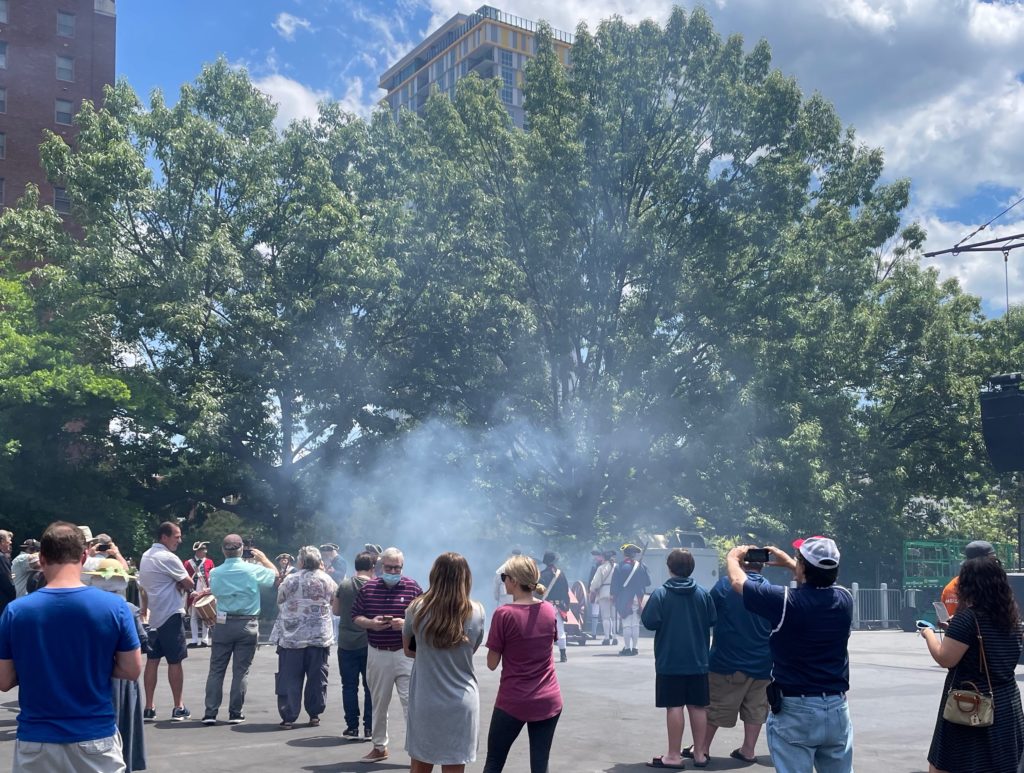Op-ed that appeared in the Charlotte Observer, the Raleigh News & Observer and the Durham Sun on May 20, 2021.

At noon Thursday, May 20, a group of North Carolinians will converge on downtown Charlotte for the 200-year-old ritual of celebrating the Mecklenburg Declaration of Independence. Planned festivities include cannon fire, cries of “Huzzah” and the muskets, tri-corner hats and brass-buttoned jackets favored by Revolutionary War re-enactors.
As with many such celebrations, beneath the pomp and circumstance lie uncomfortable historical truths – truths that we must all engage as we seek to build a better state and nation. Unfortunately, recent events show that not everyone in North Carolina is ready to do this.
Tradition holds that on May 20, 1775, a group of Mecklenburg County leaders produced the American colonies’ first official declaration of separation from Great Britain, pronouncing themselves “a free and independent people.”
Despite some doubts about the authenticity of the “Meck Dec,” it has been part of North Carolina identity since its story gained statewide notice in the early nineteenth century. May 20, 1775 has been on the North Carolina flag since 1861, and on the state seal since 1893. Since 2015 it has adorned an official state license plate that proclaims North Carolina “First in Freedom.”
What generally goes unmentioned is that many of the men associated with this call for freedom were at the same time personally depriving other human beings of that right – namely the men and women whom they had enslaved.
Just as the Declaration of Independence did not free any of the several hundred thousand residents of African descent enslaved in the American colonies in 1776, the Meck Dec sparked no local move toward freedom. In 1790, the first U.S. census reported 14 percent of Mecklenburg County residents as enslaved. Sixty years later, that ratio had grown to 40 percent.
Slavery’s proponents justified this omission by arguing that Africans were a lesser race, not worthy of the same rights bestowed on Europeans. This contradiction is as much a part of North Carolina history as the sentiments expressed in the Meck Dec. Even if the Declaration is in fact authentic, the validity of the slogan “First in Freedom” depends entirely on whose freedom counts.
Massachussetts abolished slavery in 1783. It took a war to end it in North Carolina.
North Carolina legislators took other steps to curb the liberty of Black residents both before and after the Civil War. Legislators eliminated voting rights for free Black residents in 1835, disenfranchised Black voters in 1900 and maintained a separate-and-unequal Jim Crow system for the first two-thirds of the twentieth century. More recently, a voter identification law passed in 2013 was struck down as unconstitutional by a federal court, which determined it would “target African Americans with almost surgical precision.”
Similar stories could be told about women’s rights – North Carolina legislators did not ratify the Nineteenth Amendment, which gave women the right to vote, until 1971 – and about LGBTQ+ rights and others.
In their long fight for freedom, North Carolina’s Black residents have used the Meck Dec where they could. In 1867, Charlotte’s newly emancipated African Americans chose May 20 to announce their entry into politics, describing the day as “hallowed by its associations, and connected to liberty and the political equality of man.” In 1963, activist Reginald Hawkins scheduled a key civil rights march for May 20, invoking the Declaration’s call for freedom and asserting that “There is no freedom as long as all of us are not free.”
This May, the North Carolina House passed a bill that suggests that the main effect of bringing up less-than-inspiring aspects of North Carolina history is to make certain people feel ashamed, guilty, or personally responsible for the shortcomings of the past. In a recent letter to the U.S. Secretary of Education, Senate Minority Leader Mitch McConnell decried “activist indoctrination that fixates solely on past flaws and splits our nation into divided camps.”
Not at all. Our times require an examination of our past that underscores the effort that has been required to extend the benefits of freedom to all people, the sources of resistance to that expansion, and all that remains to be done to fulfill the Declaration’s ideals. Rather than division or chagrin, such an examination can produce collective determination to do better. Slavery and its long-term consequences are not just a sideshow to the American project, they are a central component. This May 20 let us resolve to free our minds, and take up this essential work.